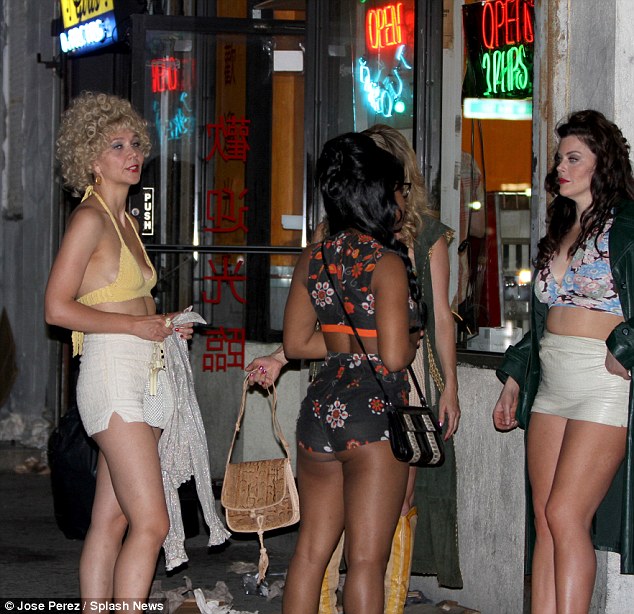We’re losing the battle for NYC streets
It’s an observation that defines an entire misbegotten era in New York. It comes from Marko Majic, head of business development for City Jeans on East Fordham Road in the Bronx.
“It looks like a bazaar in Istanbul,” he told The Post. “The only difference is in Istanbul it’s legal and organized and here it is illegal and unorganized.”
Majic was talking about the explosion of street vendors in his neighborhood who hawk an endless array of products and even set up three-card monte games. One official counted 242 vendors in an area that has 230 storefronts.
The numbers are equivalent, but the vendors are winning the war. And not just on East Fordham Road.
For months, The Post has documented the explosion of unlicensed vendors and peddlers taking over streets in neighborhood after neighborhood. The sidewalks along Fifth Avenue in Brooklyn’s Sunset Park and Flushing’s Main Street have been jammed cheek to jowl with racks and tables holding knockoff handbags, food, pottery, clothing, cosmetics, water and electronics.
In East New York, sex is openly for sale after dark as hookers prowl an industrial stretch, with johns lining up in cars and trucks as pimps keep an eye on the transactions.

The products are different, but the problems are similar — and so is the genesis. The progressive assault on law enforcement and decent public behavior did not end with the last cries of the defund-the-police movement.
A trickle-down impact is a lowering of the bar on personal conduct, allowing rampant disorder to occupy public spaces. Business is thriving in East New York because prosecutors have pulled back enforcement of prostitution.
The public use of drugs is no longer taboo, and so junkies shoot up and pass out in parks, most notoriously in Washington Square Park, driving local families mad with frustration.
Meanwhile, a March city law took vendor enforcement out of the hands of cops and handed it to the Department of Consumer and Worker Protection, which isn’t even fully operational yet.
The result of the hands-off trend is a growing foulness and squalor in public spaces, courtesy of the government’s tacit approval for peddlers, druggies and hookers to create mayhem and diminish the quality of life for residents and businesses. While it’s not as deadly or frightening as violent crime, disorder is a pernicious partner and one often bleeds into the other.
Feuds between hawkers led to a shooting in the Bronx and two in Times Square. One in May injured a 4-year-old girl and another in June wounded a Marine.
Critics of development rail against gentrification. But in many parts of the five boroughs, City Hall’s policies are leading to ghettoization.
“Because of them, we almost have no business,” Mahmood Tariq, owner of Phones & Games Center on Webster Avenue and East Fordham, told a reporter. “These vendors, they have nothing to pay, and they’re making much more money than us because everything goes to pocket. We have to pay taxes. We have to pay licenses, rent, other fees.”
Given all the political palaver about mom-and-pop shops being the lifeblood of New York, you’d think officials would be on the case to protect the small, licensed, tax-paying and tax-collecting businesses. After all, nothing says distress like a row of empty storefronts covered in graffiti.
In fact, it’s quite the opposite. Councilwoman Margaret Chin of Manhattan, who sponsored the law taking vendor enforcement away from the NYPD, has no regrets despite the impact, saying business improvement districts set up by the merchants should actually help the peddlers who are taking their customers.
She even has a name for the vendors. “They’re microbusinesses,” she said.
How clever of her to erase the distinctions between legal businesses and those who are commercial squatters. Under that ridiculous theory, squeegee men are also microbusinesses.
Don’t put it past the growing ranks of come-and-get-it progressives to eventually embrace them, too.
When down is up, when legal and illegal are the same and when cops are seen as the problem instead of the solution, there is no limit to how far a city can decline. Nor is there any limit to how much nonsense pols and advocates can add to the bonfire.

If hookers are just sex workers, why shouldn’t they, like vendors selling water and tube socks, be able to peddle their wares openly? And why only in poor neighborhoods?
And if everybody in Rikers Island is an innocent victim of a racist criminal justice system, why should anybody be arrested and prosecuted?
Come to think of it, why do we even need laws and jails?
Eric Adams narrowly got the mayoral nomination from Democrats on the strength of his promise to tackle the surge of murder, gunfire and crime. It is clearly the top order of business, and Adams is already changing the conversation among the political class.
His comments Monday that many of those arrested and released should be held in jail on bail are a direct challenge to Gov. Andrew Cuomo and the Legislature, who conspired to turn courthouse doors into revolving doors.
Almost as important, Adams, Brooklyn borough president and likely the next mayor, also addressed the mindset that high crime is inevitable.
“It really has become a place where lawlessness is the norm,” he said in a radio interview. “And that is just unacceptable.”
He’s right, of course, and saying so is a good start. If Adams stays the course and turns his words into actions and policies, he will tap into a well of support among millions of New Yorkers fed up with lawlessness and decline.
Then, and only then, can New York come back again.
No comments:
Post a Comment